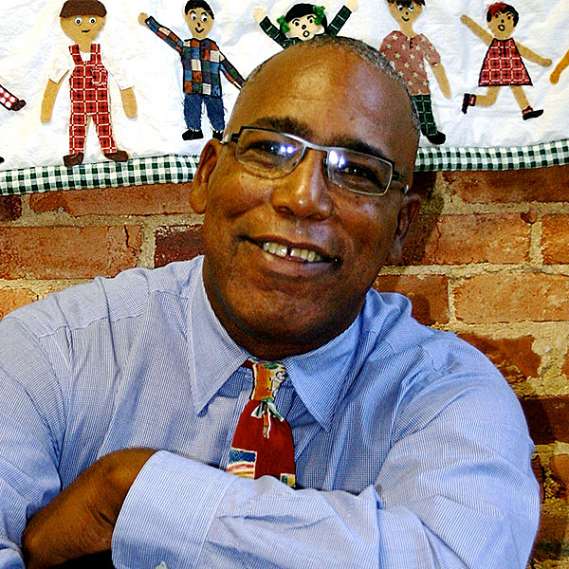
Maurice Sykes is an early childhood champion in Washington, D.C. Sykes began his careers as a teacher. This experience undoubtedly fueled his passion for early education, students, and teachers. He later became a teacher trainer, and even a curriculum developer. Sykes is currently the director of the Early Childhood Leadership Institute at the University of the District of Columbia. He author of the book, Doing the Right Thing for Children: Eight Qualities of Leadership. Sykes's book delves into his personal advocacy leadership experiences.
Advocacy Focus
Throughout his career, Sykes has advocated for the advancement of high-quality, early childhood education in Washington, D.C. One of the challenges Sykes advocates against is inequality in early childhood settings. Sykes advocates for access to high-quality early learning programs for all children. Children that live in more affluent areas in the city tend to have better teachers, better facilities, better leaders. Sykes believes that all children should have “better,” regardless of their surname, gender or economic status.
Sykes' current advocates efforts are around ending is the expulsion of preschoolers, especially boys of color. Regarding expulsion of preschoolers, the Office of Civil Rights has began drafting statistical information documenting the expulsion rates of boys of color in Pre-K. Sykes examines the cycle of trauma in children who have had Adverse Childhood Experiences (ACEs) and these ties to, re-traumatization and expulsion. Sykes says that the adverse behaviors of preschool boys of color are due to ACEs, which, in turn, cause these boys to be chronically expelled.
Another of Sykes' advocacy priorities is educator resiliency and the mental health of the caretakers. Sykes advocates for elevating the mental health concerns of caregivers to the level of advocacy organizations. In Maurice Sykes' latest campaign, he is spreading the word about the district's next important steps in advancing equality for childcare staff in Washington, D.C. Last year, eligible childcare staff were afforded access to free, quality, publicly financed health care. Washington D.C. is pioneering this effort as well as its pay Equity Fund. The Pay Equity Fund is a special fund for Early Childhood Educators, funded through a new tax on DC’s highest earners and administered bythe Office of the State Superintendent of Education (OSSE) to increase pay of child development facility staff. According to Sykes and Ostendorf (2022), the roots of child care are found among enslaved African women and persists as a low-wage, low-status profession because of enduring inequities. Sykes spends these days spreading the word of these latest advocacy causew to the centers.
Sykes on Leadership
Sykes believes advocacy is a key aspect of leadership. According to Sykes, there are eight core leadership values which include, social justice or advocacy. Sykes believes that it does not matter if you are an early childhood program leader or staff member, you must see yourself as an change agent who views high quality early childhood programs as an antidote to economic and social injustice.
In his book, Sykes also list names four key principles on which effective leadership is built. Each principle is centered around four types of knowledge:
Knowledge of yourself. To know yourself means to discover what makes you tick. Learning about your likes and dislikes helps to be true to yourself. Taking time to unearth your beliefs and values helps you understand what the guiding factors are to how you make decisions. Understanding your beliefs and values helps you to set personal boundaries. Knowing yourself frees you to accept your personality traits and increases your capacity for self-compassion.
Knowledge of leadership. Leadership traits are important know and develop. Decisiveness as a leader requires research, evaluation, problem-solving and goal setting, often with a quick turnaround. Leaders need to possess integrity. Integrity is often seen as honesty or what you do when no one else is watching. Good leaders must be creative, think outside of the box to make decisions that don't have a clear answer. A good leader must be flexible and adaptable, accepting last-minute changes or new issues. An effective leader works to create a positive work environment by building rapport and showing empathy. These leaders maintain open communication and promote a comfortable atmosphere and transparency. Leaders like these are trustworthy and reliable. They are dependable and follows through on their plans and keeppromises.
Knowledge of others includes the tools you use to communicate and interact effectively with others. These soft skills help leaders to predict behavior, relate to others, and socialize easily. According to Russell (2014), to craft knowledge is one of the missing pieces in the puzzle of high-quality teacher education and professional development. Craft knowledge is important because professional skills are necessary to deliver a high-quality education to students.
Maurice has written for numerous publications and has traveled nationwide inspiring and challenging schools and communities to do the right thing for children. In a recent interview, Sykes spoke about a new book that he is considering writing regarding doing the right thing for caregivers. He is forever an advocate for early childhood education.
References
Russell, T. (2014). Teacher Craft Knowledge. In: Gunstone, R. (eds) Encyclopedia of Science Education.Springer, Dordrecht. https://doi.org/10.1007/978-94-007-6165-0_209-4
Sykes, Maurice, and Kyra Ostendorf, eds. 2022. Child Care Justice: Transforming the System of Care for Young Children. New York, NY: Teachers College Press.
Comments
Post a Comment